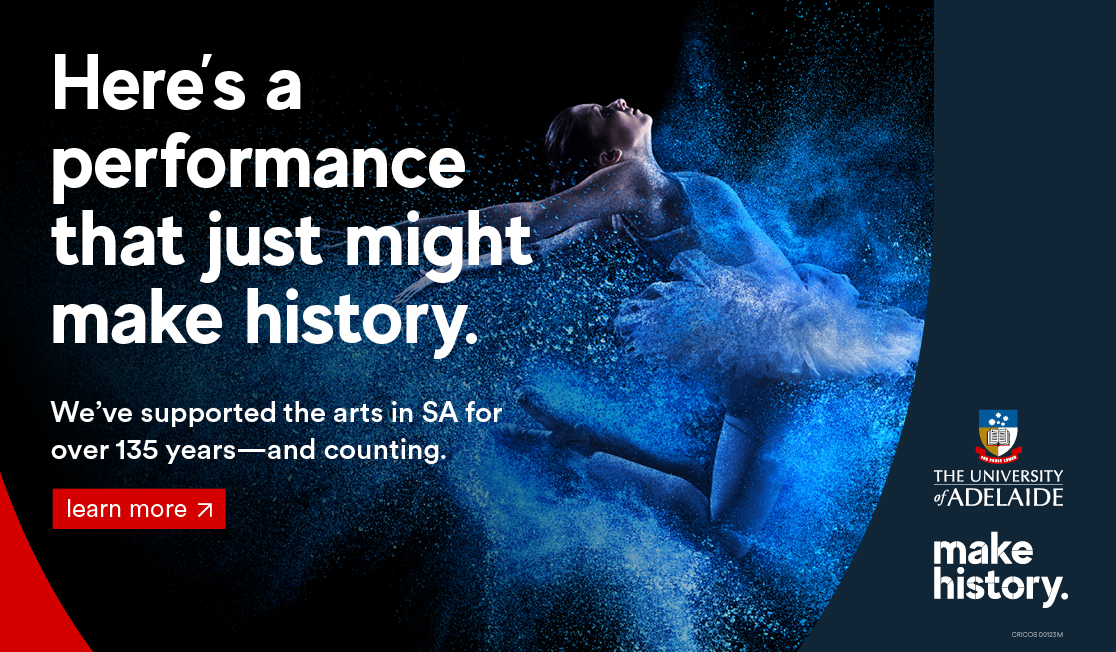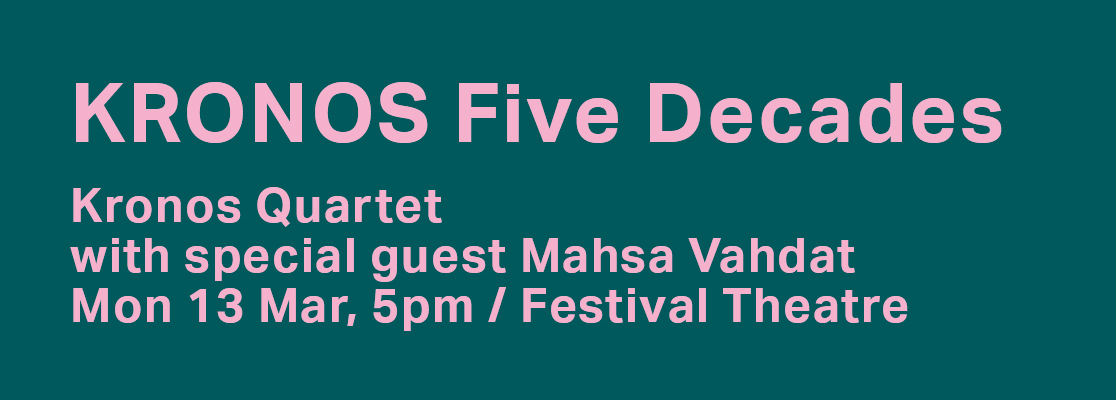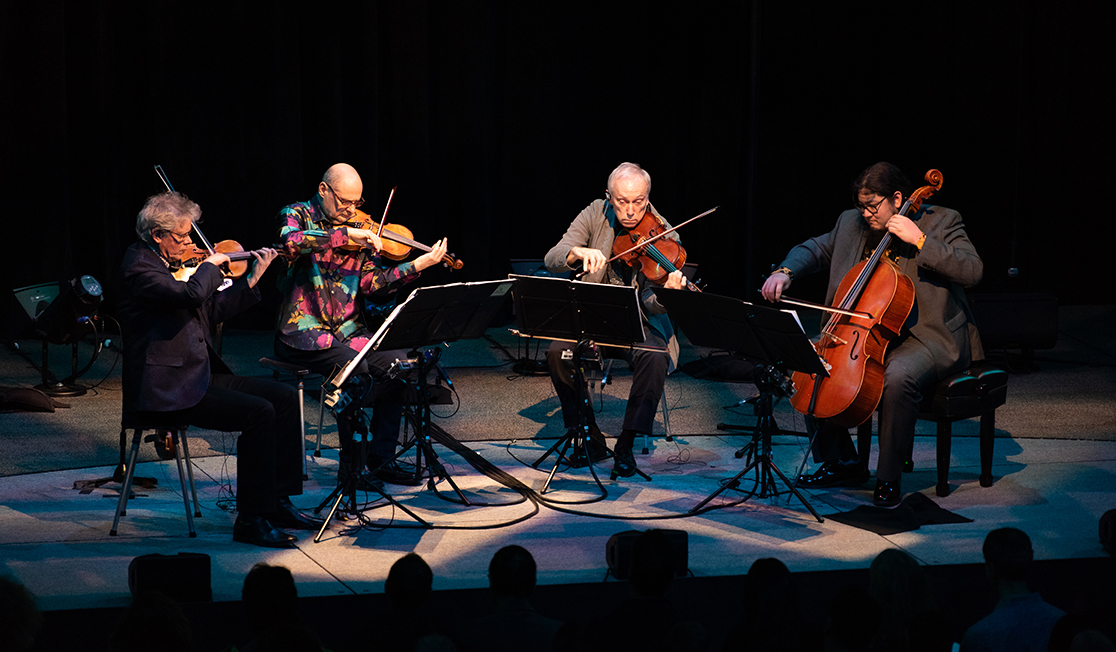Your Digital Program
Info
Credits
Adelaide Festival presents Kronos Quartet’s KRONOS Five Decades Tour
Presented by arrangement with Arts Projects Australia
KRONOS QUARTET & MAHSA VAHDAT
David Harrington, violin
John Sherba, violin
Hank Dutt, viola
Paul Wiancko, cello
Brian H. Scott, Lighting Designer
Scott Fraser, Sound Designer
Presenting Partner: The Australian

Program
Duration: 2hr 5mins, incl. interval
George Crumb / Black Angels
Aleksandra Vrebalov / ilektrikés rímes * Australian premiere
INTERMISSION
Jon Rose & Hollis Taylor / BEAK * world premiere
Missy Mazzoli / Enthusiasm Strategies **
Krzysztof Penderecki / Quartetto per archi
Kronos Quartet & Mahsa Vahdat
Mahsa Vahdat (arr. Sahba Aminikia) / The Sun Rises +
The Sun Rises
Vanishing Lines
My Ruthless Companion
Mahsa Vahdat (arr. Atabak Elyasi) / Leyli’s Nightingales +
Mahsa Vahdat (arr. Atabak Elyasi) / I Was Dead +
with special guest Mahsa Vahdat, vocals
* Written for Kronos
** Written for Fifty for the Future: The Kronos Learning Repertoire
+ Arranged for Kronos
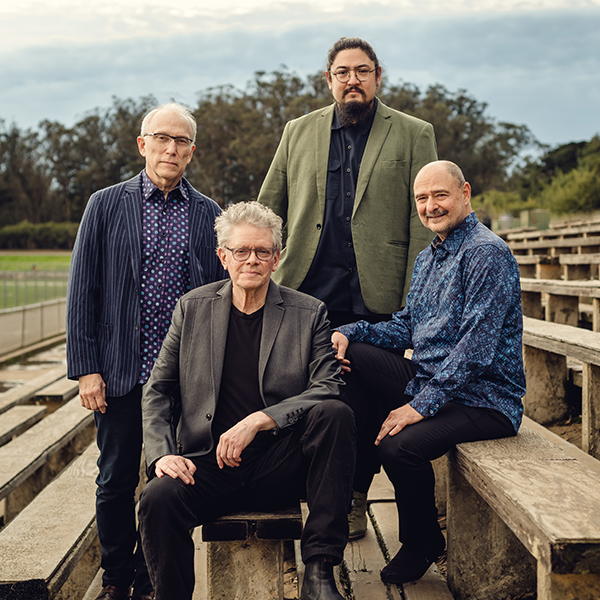
Program Note
George Crumb (1929–2022)
Black Angels (1970)
Thirteen Images From the Dark Land
I. Departure
1. Threnody I: Night of the Electric Insects
2. Sounds of Bones and Flutes
3. Lost Bells
4. Devil-music
5. Danse Macabre
II. Absence
6. Pavana Lachrymae
7. Threnody II: Black Angels!
8. Sarabanda de la Muerte Oscura
9. Lost Bells (Echo)
III. Return
10. God-music
11. Ancient Voices
12. Ancient Voices (Echo)
13. Threnody III: Night of the Electric Insects
“Things were turned upside down. There were terrifying things in the air... they found their way into Black Angels.” —George Crumb
George Crumb’s Black Angels, inspired by the Vietnam War, draws from an arsenal of sounds including shouting, chanting, whistling, whispering, gongs, maracas, and crystal glasses. The score bears two inscriptions: “in tempore belli” (in time of war) and “Finished on Friday the Thirteenth, March, 1970.”
Crumb was born in Charleston, West Virginia in 1929. His principal teacher in composition was Ross Lee Finney at the University of Michigan, Ann Arbor, where he earned his Doctor of Musical Arts degree.
Crumb’s music often juxtaposes contrasting musical styles, ranging from music of the western art-music tradition, to hymns and folk music, to non-Western musics. Many of Crumb’s works include programmatic, symbolic, mystical, and theatrical elements, which are often reflected in his beautiful and meticulously notated scores.
Crumb was the recipient of numerous honors, awards, and commissions, including: the 1968 Pulitzer Prize; the 1971 International Rostrum of Composers (UNESCO) Award; and Fromm, Guggenheim, Koussevitsky, and Rockefeller Foundation Awards. He was a member of the American Academy and Institute of Arts and Letters. In 1995 Crumb became the 36th recipient of the MacDowell Medal, which is awarded annually to a composer, writer, or visual artist who, in the judgment of his/her peers, has made an outstanding contribution to the nation’s culture.
Crumb retired from his teaching position at the University of Pennsylvania after more than 30 years of service. Crumb’s music is published by C.F. Peters, and an ongoing series of “Complete Crumb” recordings, supervised by the composer, is being issued on Bridge Records.
About Black Angels, George Crumb wrote:
“Black Angels was conceived as a kind of parable on our troubled contemporary world. The work portrays a voyage of the soul. The three stages of this voyage are Departure (fall from grace), Absence (spiritual annihilation), and Return (redemption).
“The numerological symbolism of Black Angels, while perhaps not immediately perceptible to the ear, is nonetheless quite faithfully reflected in the musical structure. These ‘magical’ relationships are variously expressed: e.g. in terms of length, groupings of single tones, durations, patterns of repetition, etc. ... There are several allusions to tonal music: a quotation from Schubert’s Death and the Maiden quartet; an original Sarabanda; the sustained B-major tonality of God-Music; and several references to the Latin sequence Dies Irae (Day of Wrath). The work abounds in conventional musical symbolisms such as the Diabolus in Musica (the interval of the tritone) and the Trillo Di Diavolo (the Devil’s Trill, after Tartini).”
Black Angels appears on Kronos’ Nonesuch recording of the same name which was released in August 1990.
The visual production of Black Angels was designed by Larry Neff with Jack Carpenter. Sound design by Scott Fraser. Set constructed by Delphi Production Company.
The staged production of Black Angels was commissioned by Hancher Auditorium, University of Iowa.
Program Note
Aleksandra Vrebalov (b. 1970)
ilektrikés rímes (2021)
I. the golden rhyme of pythagoras I
II. the rhyme of circular time
III. the golden rhyme of pythagoras II
IV. plutonian rhyme I
V. high frequency currents
VI. plutonian rhyme II
VII. the rhyme of rebirth
VIII. secret command
Aleksandra Vrebalov’s 90 works—ranging from concert music and opera to music for modern dance and film—have been performed by the Kronos Quartet, Serbian National Theater, English National Ballet, Rambert Dance, Sybarite5, Jorge Caballero, the Sausalito Quartet, ETHEL, Dusan Tynek Dance Company, Ijsbreker, Moravian Philharmonic, Belgrade Philharmonic, and Providence Festival Ballet, among others. Vrebalov’s cross-disciplinary interests led to participation at residencies and fellowships that include the MacDowell Colony, Djerassi, The Hermitage, New York’s New Dramatists, Rockefeller Bellagio Center, American Opera Projects, Other Minds Festival, and Tanglewood. Between 2007 and 2011, Vrebalov created and led Summer in Sombor (Serbia), a weeklong composition workshop with the South Oxford Six composers’ collective that she co-founded in 2002 in NYC. The workshop facilitated the creation of over 50 new works by young composers from Europe and the USA.
Most recently, Vrebalov joined Muzikhane (House of Music) founded by composer Sahba Aminikia in Mardin and Nusaybin, towns on Turkish/Syrian border, and for six weeks made music with young refugees from Syria and Iraq.
Vrebalov received The Charles Ives Fellowship from the American Academy of Arts and Letters, The Hoefer Notable Alum Prize from the San Francisco Conservatory, The Harvard Fromm Commission, the Barlow Endowment Commission, as well as awards from ASCAP, American Music Center, Meet the Composer, MAP Fund, Vienna Modern Masters, and Friends and Enemies of New Music. As the Douglas Moore Fellow (2004), supported by the Columbia University’s Alice Ditson Fund, she spent a season in the Glimmerglass Opera, Opera Memphis and Florida Grand Opera, where she immersed herself in all aspects of opera production. Her opera Mileva (2011) had its world premiere at the 150th Anniversary season of the Serbian National Theater in Novi Sad.
As a Serbian expat Vrebalov is the recipient of the Golden Emblem from the Serbian Ministry of Foreign Affairs for lifelong dedication and contribution to her native country’s culture. She combines her time between New York City and Novi Sad, Serbia.
About ilektrikés rímes, Aleksandra Vrebalov writes:
“ilektrikés rímes (Electric Rhymes) is a plea for health, love, and creativity, after times of disease and fear. It celebrates the omnipresent creative spirit expressed in a messy and unceasing life force swirling around and within us. The piece was supposed to mark my 50th birthday, celebrating my long-lasting, productive relationship with Kronos Quartet. Instead, I wrote it at the height of the pandemic and its premiere coincided with the destruction and loss of life unseen in Europe since the falling apart of my country of origin, former Yugoslavia in 1990s. From a birthday song, ilektrikés rímes evolved to a meditation, a lament, a cry, and, more than anything, to a prayer for peace on planet Earth.
“Monk Hierotheos and members of the Kovilj Monastery Choir in northern Serbia chant in old Slavonic an excerpt of “The Secret Command,” the Apolytikion of the Saturday of the Akathist (the fifth Saturday of Lent) in plagal fourth mode: “I stand in awe and cry out to You: Rejoice, O Bride unwedded.
“The work is dedicated to the memory of George Crumb and of my father Stevan Vrebalov.”
Aleksandra Vrebalov’s ilektrikés rímes was commissioned for the Kronos Quartet by Carnegie Hall and the David Harrington Research and Development Fund.
Program Note
Jon Rose (b. 1951) and Hollis Taylor (b. 1951)
BEAK (2023)
For two decades, Dr Hollis Taylor has recorded, transcribed, and analysed the vocalisations of Cracticus nigrogularis, the Australian pied butcherbird. From hundreds of rigorously transcribed songs, she and her partner, Jon Rose, have created a catalogue of interspecies music: avian and human cultures meeting through the medium of music.
The process of transcription from bird to human instrument is sonically transformative, since the instrument is not simply playing the same notes as the bird: the physiological character of each instrument also impacts the music. Whether transposed, inverted, augmented, or unchanged, a bird phrase played on a trumpet creates distinct sensory effects and meanings from those played on a violin.
Daytime group songs are performed by up to five or six birds in what can only be described as ‘hockets’ (where each bird contributes independent parts to a whole line and structure), while BEAK takes advantage of nocturnal solo songs, where one bird may sing up to seven hours of music. (Taylor counters arguments of human exceptionalism in her monograph Is Birdsong Music? Outback Encounters with an Australian Songbird). The three sections of BEAK feature the same bird transforming his/her song (both sexes sing) over the years 2016, 2019, and 2021.
Towards the end of the 2019 section, our bird explodes into a mimicry sequence, including anthropogenic sounds (telephone ringtone and car alarm), a dog, and a cat. The avian mimicker here strings together snippets of crested pigeon, budgie, honeyeater, ring-necked parrot, peregrine falcon, Australian magpie, masked lapwing, peaceful dove, crested pigeon (wing sound), yellow-throated miner, grey shrike-thrush, black-faced cuckoo shrike, and galah.
Mostly, pied butcherbirds sing high up in the trees and the chances of videoing a black and white bird singing in the dark are remote, but tonight you will see the bird at Araluen Arts Centre (in Mparntwe - Alice Springs) in the final section of the composition - a rare glimpse of one the great songbirds on the planet.
The role of Jon and Hollis in this and other “pied productions” is more that of arranger than composer. They seek to highlight, rather than improve, what is already fascinating and glorious in this uniquely ancient and modern Australian music, which has been heard on our planet for the last thirteen million years. This work sets itself the task of meticulously taking seriously the sonic constructs of another species. For Kronos, the challenge is ‘how to be bird’ and ‘what if bird could’.
Jon Rose’s primary life's work is The Relative Violin. This development of a total artform based around the one instrument includes innovation in the fields of new instrument design, environmental performance, new instrumental techniques, radiophonic works, and the development of inter-active electronics. He is featured regularly in the main festivals of New Music, Jazz, performance and Sound Art such as Ars Elektronica, Festival D’Automne, Maerzmusik, Dokumenta, North Sea Jazz Fest, New Music America, the Vienna Festival, the Berlin Jazz Festival, Moers Festival, The Melbourne Festival, Mona Foma, and more. Rose has appeared on over 100 albums and CDs and has worked with many of the innovators and mavericks in contemporary music such as Kronos Quartet, Derek Bailey, Alvin Curran, Otomo Yoshihide, Ilan Volkov, Christian Marclay, and John Zorn. In 2012, The Australia Council honoured him with The Music Board senior prize, the Don Banks Award for lifetime achievement and contribution to Australian music. His book about the state of music today Music of Place: Reclaiming a Practice was published by Currency House Press (2013). Jon curates his own violin museum of over 1,000 artifacts, The Rosenberg Museum, in Alice Springs (Mparntwe).
Violinist/composer, zoömusicologist, and ornithologist Hollis Taylor is an ARC Future Fellow at the Sydney Conservatorium of Music. Previous research fellowships include the Institute for Advanced Study (Berlin), Museum of Natural History (Paris), University of Technology Sydney, and Macquarie University. Her work confronts and revises the study of birdsong, adding the novel reference point of a musician’s trained ear. Hollis performs her (re)compositions of avian songs on violin along with her field recordings, and also rethinks pied butcherbird repertoire for other human instruments and voices. Central to her compositional ethos is to celebrate avian achievements rather than adding human “improvements.” Recent commissions include from Kronos Quartet, Ensemble Offspring, and Musica Viva, and the Australia Council supported her and Jon's birdsong concerto for recorder, performed by Genevieve Lacey and the Adelaide Symphony, London Sinfonia, and Melbourne Symphony. In addition to her double CD, Absolute Bird, and monograph, Is Birdsong Music?, her practice takes in sound and radiophonic arts, all celebrating the aesthetic achievements of animals. She is also author of Post Impressions: A Travel Book for Tragic Intellectuals, which documents (in text, audio, and video) Jon Rose and herself bowing fences throughout Australia.
Program Note
Missy Mazzoli (b. 1980)
Enthusiasm Strategies (2019)
Recently deemed “one of the more consistently inventive, surprising composers now working in New York” (New York Times) and “Brooklyn’s post-millennial Mozart” (Time Out New York), Missy Mazzoli has had her music performed globally by the Kronos Quartet, eighth blackbird, violinist Jennifer Koh, LA Opera, New York City Opera, the Minnesota Orchestra, Cincinnati Opera and many others. From 2012-2015 she was Composer-in-Residence with Opera Philadelphia, Gotham Chamber Opera and Music Theatre-Group, and in 2011-2012 was composer-in-residence with the Albany Symphony.
Mazzoli’s 2016 opera Breaking the Waves, based on the film by Lars von Trier and created in collaboration with librettist Royce Vavrek, was commissioned by Opera Philadelphia and Beth Morrison Projects. It premiered in September of 2016 and was called “one of the best 21st-century American operas yet” by Opera News, “powerful… dark and daring” by the New York Times, and “savage, heartbreaking and thoroughly original” by the Wall Street Journal. In February 2012, Beth Morrison Projects presented Song from the Uproar, Mazzoli’s first multimedia chamber opera, which had a sold-out run at venerable New York venue The Kitchen. The Wall Street Journal called this work “both powerful and new”, and the New York Times claimed that "in the electric surge of Mazzoli's score you felt the joy, risk and limitless potential of free spirits unbound."
Recent months included the premiere of Missy’s third opera, Proving Up, at Washington National Opera, the premiere of Vespers for a New Dark Age, an extended work for her ensemble Victoire and Wilco drummer Glenn Kotche, commissioned by Carnegie Hall, and new works performed by pianist Emanuel Ax, the BBC Symphony, the LA Philharmonic and the Detroit Symphony. Upcoming commissions include new works for Opera Philadelphia, the National Ballet of Canada, Opera Omaha, and New York’s Miller Theatre.
Mazzoli is the recipient of a Fulbright Grant, a 2015 Music grant from the Foundation for Contemporary Arts, and four ASCAP young composer awards. Along with composer Ellen Reid, she recently founded Luna Lab, a mentorship program for young female composers in collaboration with the Kaufman Music Center in New York. Mazzoli teaches composition at the Mannes School of Music (The New School), and her works are published by G. Schirmer.
About Enthusiasm Strategies, Missy Mazzoli writes:
“I think of music itself, particularly the music made by the Kronos Quartet, as a strategy for mustering enthusiasm and joy. It’s a way of setting the world in order, a method of carving up time in way that, seemingly by magic, changes our frame of mind, energizes us, and gives us courage and reassurance. In this piece, I tried to combine techniques that were both scary and familiar to me; a cascade of natural harmonics collapses into an ecstatic chorale, which then evaporates into silence. Enthusiasm Strategies was composed for the Kronos Quartet as part of their amazing and important educational initiative Fifty for the Future. I’m honored to contribute to this project and thrilled to be part of the incredible legacy of this quartet.”
Missy Mazzoli’s Enthusiasm Strategies was commissioned as part of the Kronos Performing Arts Association’s Fifty for the Future: The Kronos Learning Repertoire, which is made possible by a group of adventurous partners, including Carnegie Hall and many others.
Launched in the 2015/16 season, Kronos’ Fifty for the Future has commissioned 50 new works devoted to contemporary approaches to the string quartet and designed expressly for the training of students and emerging professionals. Kronos has premiered each piece and created companion digital materials, including scores, recordings, and performance notes, which can be accessed online for free at 50FTF.kronosquartet.org.
Program Note
Krzyzstof Penderecki (1933–2020)
Quartetto per archi
Kronos revisits a group milestone—the quartet’s first ever-staged production (designed by Larry Neff), Live Video (1986)—in this reprise performance of Penderecki’s early work for string quartet. One in a series of early ’60s pieces that would garner the young Polish composer an international reputation, the Quartetto per archi overflows with musical events and textures. Layers of lightly tapping bows give way to the crackle of plucked strings, barely audible bowed harmonics, sudden low-register growls, and more. This is tantalising music, the sound of intriguing extremes: high and low, gentle and harsh, explosive and hushed.
Penderecki also brought this fearlessly inventive approach to writing for strings to his large-ensemble works of the period, including 1959’s critically acclaimed Anaklasis (featuring 42 strings) and the harrowing Threnody for the Victims of Hiroshima (1959-61), a ten-minute piece for 52 strings that remains one of the most popular of Penderecki’s works throughout the world. It was also with the Threnody that the composer debuted a new form of optical notation for his work. Like so many inventions, this one was born of necessity.
“I had to write in shorthand,” Penderecki says, “something for me to remember, because my style of composing at that time was just to draw a piece first and then look for pitch….I just wanted to write music that would have an impact, a density, powerful expression, a different expression….I used to see the whole piece in front of me—Threnody is very easy to draw. First you have just the high note, then you have this repeating section, then you have this cluster going, coming—different direction from the one note, twelve, and back—using different shapes. Then there is a louder section; then there’s another section, then there is the section which is strictly written in 12-tone technique. Then it goes back to the same cluster technique again, and the end of the piece is a big cluster, which you can draw like a square and write behind it fortissimo….I didn’t want to write in bars, because this music doesn’t work if you put it in bars.”
Born in Debica, near Krakow, in 1933, Krzysztof Penderecki was introduced to music at an early age by his father, a lawyer and violinist. Enrolling at the Krakow Conservatory at the age of 18, he graduated in 1958 and was soon appointed professor at the Musikhochschule.
In 1959, Penderecki’s works Strophes, Emanations, and Psalms of David won first prizes in the 2nd Warsaw Competition of Young Polish Composers of the Composers’ Union. Following the subsequent successes of Anaklasis and Threnody, Penderecki went on to compose such major works as the multiple award-winning St. Luke Passion (1966) and the opera The Devils of Loudon (1967), based on Aldous Huxley’s book of the same title. His extensive body of work now boasts four operas and seven symphonies, including 1996’s Seven Gates of Jerusalem (a.k.a. Symphony No. 7), commissioned by its namesake city for the “Jerusalem—3000 Years” celebrations.
Penderecki was the recipient of many awards and honorary degrees, including a 1998 “Foreign Honorary Membership” in the American Academy of Arts and Letters; the 2000 Cannes Classical Award for “Living Composer of the Year”; the 2001 Prince of Asturias Award for the Arts; and the 2002 Romano Guardini Prize of the Catholic Academy in Bavaria.
Video by Alexander V. Nichols, Larry Springer, and Dan D. Shafer.
Program Note & Texts
Mahsa Vahdat (b. 1973)
The Sun Rises (2016)
The Sun Rises
Vanishing Lines
My Ruthless Companion
Arranged by Sahba Aminikia (b. 1981)
About The Sun Rises, Sahba Aminikia writes:
“Mahsa Vahdat is one of the most iconic female singers of contemporary, post-revolutionary Iran. She and her sister Marjan Vahdat have toured around the globe and have held numerous concerts throughout Asia, Europe, North America, and Africa, while maintaining their roles as strong advocates of freedom of expression.
“Since the Islamic revolution in 1979, women have been banned from singing in public, and especially in front of male audiences. Mahsa and Marjan Vahdat’s appearance on a scene from the controversial movie about Tehran’s underground music scene, “No One Knows About Persian Cats” (2009), while singing without Hijab on a rooftop in Tehran presented a monumental image of freedom to the young women of my country for decades to come.
“I am honored that I was able to bring the forces of Mahsa Vahdat and Kronos Quartet together and was able to help with this historic collaboration. This piece embodies three of Mahsa Vahdat’s songs from two of her solo albums, Traces of an Old Vineyard and A Capella - The Sun Will Rise.”
Texts
The Sun Rises
Poem by Forough Farrokhzad
See how sorrow melts drop by drop
In my eyes
How my mutinous shadow
Becomes prey for the Sun
See
How my whole existence is in ruins
An ember set fire to my being
I am lifted to heights
I am trapped
See
How my entire horizon
Fills with shooting stars
You came from afar
From the land of perfume and light
You set me on a Stellar path
You take me beyond stars
Now that we are treading on heights
Wash me with waves of wine
Wrap me in the velvet of your kiss
Want me in the lasting nights
Leave me no more
Separate me not from these stars
See
How you shine and the Sun rises
Vanishing Lines
Poem by Hafez
English translation: Sohrab Mahdavi
A life ring is my longing for you,
drowning, as I am, in wine
Advise the barrel to keep the air locked,
for the tavern is in ruins
The beloved is gone and in my tearful eyes
Her image can only be drawn in vanishing lines
Wake up my eyes for there is great peril
In this onslaught of sleep of mine
The mountains and plains are full and verdant
This world is but a passing current,
let us waste no time
My Ruthless Companion
Poem by Rumi
English translation: Sohrab Mahdavi
Oh my companion, my ruthless companion
My beloved and my treasurer, my ally and my secret bearer
On earth you are my moon, at midnight you are my morning dawn
Oh, my sweet mist, you are my protection in this storm
You find your way into my soul like a healing worm
You are my faith and my religion, a sea of gems brimming
You are a torch to night-farers, a rope to the drowning
You are a compass to any caravan, you are my guide
You are my cellmate in this prison, a laughing master at my side
To be in your presence requires a hundred times my best stride
Text
Leyli’s Nightingales
Poem: Atabak Elyasi
Melody: Mahsa Vahdat
Arrangement: Atabak Elyasi
English translation: Mahsa Vahdat and Erik Hillestad
Once upon a time a lover gave to Leyli
two nightingales which were flying in a garden
One of the nightingales is made by dawn and light
the other one is from the light of the moon and the sun
One sings from the depth of her heart
the bitter story of the present times
The other one makes songs from the stars
and spreads them to the graveyard of the nameless
If Leyli touches the two nightingales,
they will sing the song of liberation
Text
I Was Dead
Poem: Rumi
Melody: Mahsa Vahdat
Arrangement: Atabak Elyasi
English translation: Mahsa Vahdat and Erik Hillestad
I was dead, I became alive, I was tears,
I became laughter
The happiness of love came,
and I became eternal happiness
My eyes are full of joy, I have a brave soul
I have courage like a lion, I became the shining Venus
He told me: you are not crazy enough,
you don’t deserve this home
I went and became crazy,
I was entangled with chains
He told me: you are not drunk,
go away, you don’t belong to this circle!
I went and became intoxicated,
I was filled with joy
I belong to you, my moon, come and
behold you and me!
Because of his laughter,
I became a laughing garden
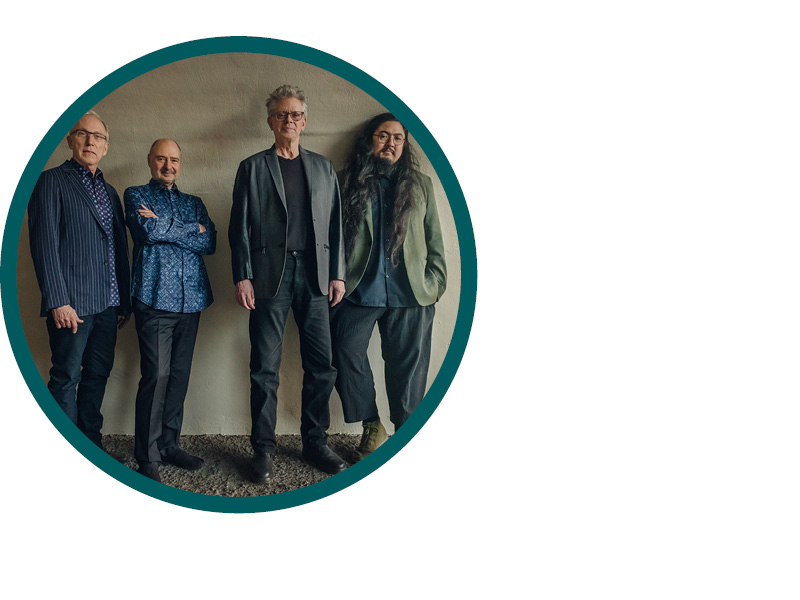
Kronos Quartet
For nearly 50 years, San Francisco’s Kronos Quartet - David Harrington (violin), John Sherba (violin), Hank Dutt (viola), and Paul Wiancko (cello) - has reimagined what the string quartet experience can be. One of the most celebrated and influential groups of our era, Kronos has given thousands of concerts worldwide, released more than 70 recordings, and collaborated with many of the world’s most accomplished composers and performers across many genres. Through its nonprofit organization, Kronos Performing Arts Association (KPAA), Kronos has commissioned more than 1,000 works and arrangements for quartet. Kronos has received more than 40 awards, including the Polar Music, Avery Fisher, and Edison Klassiek Oeuvre Prizes.
Integral to Kronos’ work is a series of long-running commissioning collaborations with hundreds of composers worldwide, including Terry Riley, Aleksandra Vrebalov, Tanya Tagaq, Philip Glass, inti figgis-vizueta, Fodé Lassana Diabaté and Steve Reich. In its most ambitious commissioning effort to date, KPAA has recently completed 50 for the Future: The Kronos Learning Repertoire. Through this initiative, Kronos has commissioned—and distributed online for free—50 new string quartet works written by composers from around the world.
In recordings, Kronos has collaborated with artists including Wu Man, Zakir Hussain, Asha Bhosle, Mahsa Vahdat, and Nine Inch Nails. Kronos has performed live with the likes of Paul McCartney, Allen Ginsberg, Rokia Traoré, David Bowie, Rhiannon Giddens, Caetano Veloso, and The National, among many others.
The quartet tours for several months each year, appearing in celebrated venues, including Carnegie Hall (New York), Palacio de Bellas Artes (Mexico City), the Barbican (London), the Muziekgebouw (Amsterdam), Shanghai Concert Hall, Suntory Hall (Tokyo), and the Sydney Opera House.
Kronos’ expansive discography on Nonesuch includes three Grammy-winning albums - Terry Riley’s Sun Rings (2019), Landfall with Laurie Anderson (2018), and Alban Berg’s Lyric Suite (2003) - along with dozens of other acclaimed releases. Kronos’ most recent recording is Mỹ Lai (2022), an opera by Jonathan Berger and Harriet Scott Chessman. Kronos’ work has also featured prominently in many films, including the “live documentary” A Thousand Thoughts, written and directed by Sam Green and Joe Bini, which premiered at the Sundance Film Festival in 2018.
Based in San Francisco, the nonprofit KPAA staff manages all aspects of Kronos’ work, including commissioning, concert tours and local performances, recordings, education programs, and an annual Kronos Festival in San Francisco.
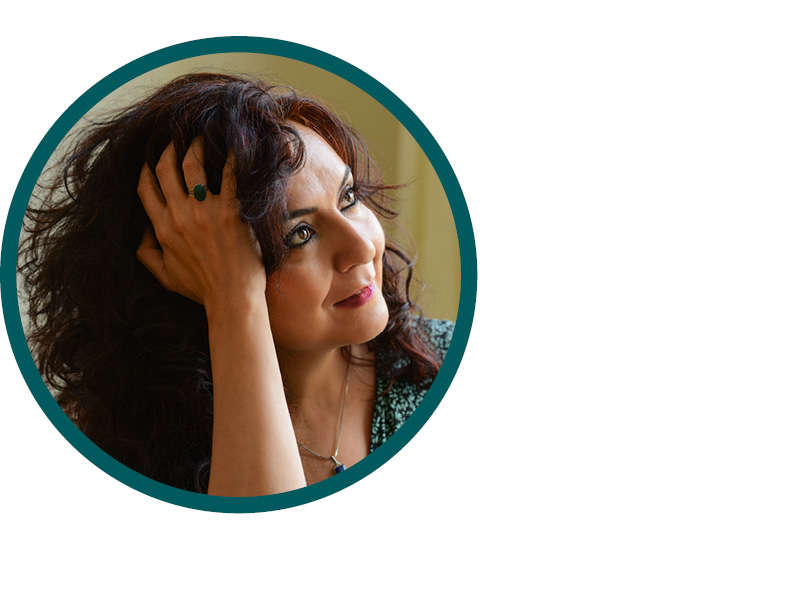
Mahsa Vahdat
Mahsa Vahdat is an award-winning Iranian singer, composer and cultural activist dedicated to both her personal lifelong musical and artistic path and the greater cause of freedom of expression. Her artistic work has offered audiences around the globe a deeper appreciation of Iranian poetry and music.
Born in 1973 in Tehran, she received her B.A. in Music from the Tehran University of Arts and learned Persian traditional music with different masters. Since 1995, she has performed as an independent singer and musician in many concerts and festivals in the world. She has also appeared on stage with her sister Marjan Vahdat in many concerts.
Mahsa Vahdat has developed a highly personal style of performance, rooted in Persian classical and regional vocal music traditions and infused with contemporary and innovative expressions and influences. Her many performance and recording projects include collaborations with many of the world's most acclaimed musicians including Mighty Sam McClain, Kronos Quartet, Tord Gustavson, Teatr Zar, SKRUK Choir, Kitka, and countless others. Through creative dialogues with her collaborators, and explorations as an unaccompanied soloist, she has developed a diverse, unique, and wide-ranging repertoire.
Following her participation in the album Lullabies from the Axis of Evil (2004), Mahsa started a long lasting collaboration with the Norwegian record label Kirkelig Kulturverksted (KKV). This collaboration led to a worldwide release of a series of award wining and critically acclaimed records.
Without being visible in her own society because of restrictions of female solo voice after Islamic Revolution in 1979 in Iran, she and her sister Marjan Vahdat have had continuous contact with a large audience who appreciates their art, both in Iran and abroad.
For Mahsa, artistic practice, creative freedom, and humanitarian principles are closely intertwined. She is an extremely effective cultural worker who utilises the emotive power of her voice to raise awareness of suffering and injustice in the world, while simultaneously delivering messages of hope, and positive change.
Kronos Performing Arts Association
Katie Baird, Development Associate
Janet Cowperthwaite, Executive Director
Mason Dille, Development Director
Dana Dizon, Business Manager
Sarah Donahue, Operations Director
Deja Jenkins, Production and Marketing Associate
Reshena Liao, Creative Producer
Nikolás McConnie-Saad, Artistic Administrator
Hannah Neff, Tour Manager, Australia
Arts Projects Australia
Arts Projects Australia (APA) is an arts and event management company which operates as a producer and presenter of high quality contemporary performing arts and events.
Ian Scobie AM, Director
Lee Cumberlidge, Director
Daniel Vorrasi, Producer
Dani Ricciardi, Marketing Director
Mark Muller, Production Manager
Di Farrell, Administrator







Festival for the Future
Adelaide Festival is proudly Carbon Neutral and you can help us reduce our impact on the environment further! This year, Adelaide Festival has partnered with Reforest and Trees for Life to support the Mannavale farm bushfire recovery project in Adelaide Hills.
Plant one for the planet as part of your Adelaide Festival experience. You can learn more about the project, take action and track your impact here.
Your contribution through Reforest will help repair the damage caused by both bushfires and historical land clearing, and help Trees for Life plant a range of native species to restore an area of forest habitat for native wildlife.
